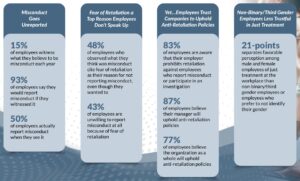Developing a culture of transparency that promotes and sustains disclosure (speaking up) can yield advantages beyond merely decreasing misconduct. When employees feel empowered to speak up, they are more inclined to report issues related to safety, care, and to contribute service improvement suggestions, among other things.
My firm, H2 Healthcare, has a robust compliance practice. We work with clients on risk management, regulatory compliance, pre and post survey support, and complex litigation support. Those organizations that have strong compliance programs, engaging staff and management, that foster disclosure and communication, have far less compliance problems and likely, far lower incidents of litigation.
Organizations with advanced ethics and compliance functions prioritize a speak-up culture as a key component of their broader integrity culture. However, no organization is flawless in fostering a speak-up culture. Per a report from Ethisphere, the following concerns are known, and common. The report is available here: Ethisphere-2024-Ethical-Culture-Report
- At every workplace, there are employees who are not aware of the organization’s speak-up policies and procedures, including anti-retaliation guardrails to protect those who raise their hand over perceived workplace misconduct.
- At every workplace, there are employees who would not be willing to report misconduct if they were to witness it—usually because they do not believe that the organization will take action against it, or that they will face career-damaging retaliation by colleagues and managers.
- And, at every workplace there are employees who say they would report misconduct, but when they actually witness it, hesitate at the moment of truth—again, typically out of a lack of confidence in the organization or fear of retaliation.
This same report indicates that within every organization, a discrepancy exists between the number of employees who claim they would report misconduct and those who actually do report it upon witnessing. On average, this disparity, known as the ‘speak-up gap’, results in approximately 75 instances of misconduct remaining unreported each year for every 1,000 employees.

In healthcare settings, providers participating in Medicare all have an Ethics and Compliance program requirement. As of now, while this requirement is newer, it is not new. Still, not enough providers truly embrace what is required, use a sound program methodology for risk management and education, and/or have adopted best practices and integrated the same from senior leadership and governance, all the way down the organization. In February, I wrote a post on compliance, including a bunch of reference materials and articles. I’d encourage anyone reading this post, to read the February post. https://rhislop3.com/2024/02/21/wednesday-feature-navigating-the-evolving-landscape-enhancing-ethics-and-compliance-programs-for-risk-mitigation/
Developing a culture of disclosure is structurally, not difficult but implementation and then maintenance, does require consistent attention. The following steps are unavoidable (for a good program) in terms of implementation and then maintenance.
Implementation
- Develop policies and procedures on what needs/should be disclosed and how. A policy of non-intimidation non-retaliation is critical.
- Educate staff on the policies and procedures, etc. I recommend not just lectures but dramatization of case examples, etc. Senior Management needs to be a part of this process.
- Educate the public, patients and visitors, on the program and the organization’s commitment to compliance and how anyone can disclose a concern. This again, needs to multi-modal – internet, social media, posters, handouts on admission, etc.
- Establish disclosure opportunities that allow for anonymity. Suggestion boxes at multiple locations, a toll-free hotline, a dedicated secure email that links to organization internet pages, social media, etc.
Maintenance
- Education – team meetings, in-services, on/at hire/orientation – required.
- Staff surveys, customer surveys – use a third party. This is the audit phase, and it is a requirement to assure that program integrity exists and that goals are being met. This also includes conducting a review of any reported concerns via the disclosure sources (emails, phone calls, etc.).
- Include 2 above as a QAPI element for review.
- As part of staff exit interviews, add an element of “disclosure safety” as part of the interview. Take any concern seriously and address.
- Review policies and procedures to assure that compliance requirements via CMS are being met and/or are consistent with Depart of Justice expectations for reporting. For example, the Department of Justice has taken heightened interest in Medcare billing fraud as of late. https://rhislop3.com/2024/07/11/medicare-fraud-2-75-billion-recovered/
A good resource on recent DOJ changes to their corporate criminal enforcement policies is here: DOJ Announces New Changes to Corporate Criminal Enforcement Policies | White & Case LLP (whitecase.com)